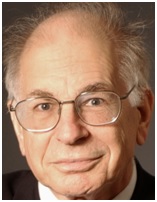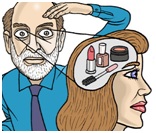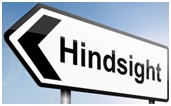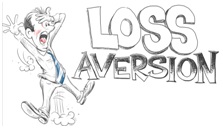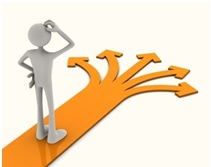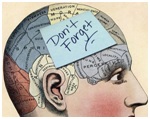|
 |
|
 |
Daniel Kahneman, Thinking, Fast and Slow (2011)
Kahneman (pictured right) is an Israeli-born American psychologist He won the 2002 Noble Prize in Economics for his work on decision making with another Israeli-American, Amos Tversky (1937-96), pictured right below.
See also... Daniel Kahneman in the
Psychologists section.
Book summary
Kahneman's tips on decision making
1. People are irrational and intuitive Most of our thinking is based on: System 1 Fast thinking based on:
We don’t use: System 2 Slow (logical and analytical) thinking that weighs up the pro’s and con’s of a decision
with all relevant information. We should use System 2 to check for any System 1 inaccuracies (see point 2). But we don’t because we’re lazy – System 2 involves:
System 1 is responsible for most of your:
2. Heuristics (rules of thumb)
a) availability heuristic Decisions based on things that are easy to remember (often because they’ve been in the media). b) simplifying heuristic Stereotyping people into categories. Two of Kahneman’s famous examples are: Steve - presumed to be a librarian rather than a farmer because he’s shy with a passion for order and detail (although it’s more likely he’ll be a farmer because there are more farmers than librarians). Linda - socially conscious, educated and single (who is presumed to be not just a bank teller but a bank teller active in the feminist movement!)
3. Law of small numbers More extreme results are likely from small samples of the population.
4. Anchors What you say is related to what you are suggested to do (the anchor). For example, a house’s asking price will affect what you pay for it.
5. Causes, not facts Causes (your understanding of the world) are much more important than facts (statistical or otherwise). “The test of learning psychology is whether your understanding of situations you encounter has changed, not whether you have learned a new fact”, Kahneman says He could have said this about any subject.
6. Organizations make better decisions than individuals This is because the organization’s processes and procedures (like quality control) are based on System 2 analytical thinking. 7. Question yourself and learn Accept:
We must learn from the past, but beware of:
a) the illusion of understanding (where we think we understand the past but we don’t) b) hindsight (which can make you overconfident or criticized for past decisions). It is difficult to learn from successful companies (like Google), because it’s impossible to replicate the factors that made them so profitable. Their success might also turn into failure. 8. What you see is all there is (WYSIATI) This excludes relevant unseen information and is common in System 1 thinking. This leads to the:
9. Prospect theory This says: a) people are loss averse (avoiding losses is more important than making gains). So political reforms will favour potential losers, because they will fight harder to protect their status quo position (see next point) than potential winners.
b) people evaluate results according to “reference points” (like future aims and the status quo) If you do better than the reference point it’s a gain e.g. exceeding your aims and status quo position (including current wealth and privileges). If you do worse than the reference point, it’s a loss, so defending the status quo is vital.
c) people are risk averse towards gains (but take risks to minimize losses).
d) unlikely extremes are over-exaggerated People give undue importance to highly unlikely but extreme events (like winning the lottery).
10. The planning fallacy This:
Such over-confidence and optimism are:
11. The endowment effect This occurs where people place a higher price on what they own than what they don’t. 12. The remembering self and the experiencing self Decisions are based on your memory of the past (the remembering self), not what you actually experienced (the experiencing self). The problem is: “Tastes and decisions are shaped by memories and the memories can be wrong”, Kahneman says.
Key quotes on decision making System 1 is indeed the origin of much that we do wrong but it is also the origin of most of what we do right. Extreme predictions and a willingness to predict rare events from weak evidence are both manifestations of System 1.
Key quote on learning The test of learning psychology is whether your understanding of situations you encounter has changed, not whether you have learned a new fact.
|
|
|
||
|
|
|
||
|
||
| Copyright © wisdomtowin.com All Rights Reserved | ||
|

